‘Just being part of UU is amazing’, says UU’s most average international student
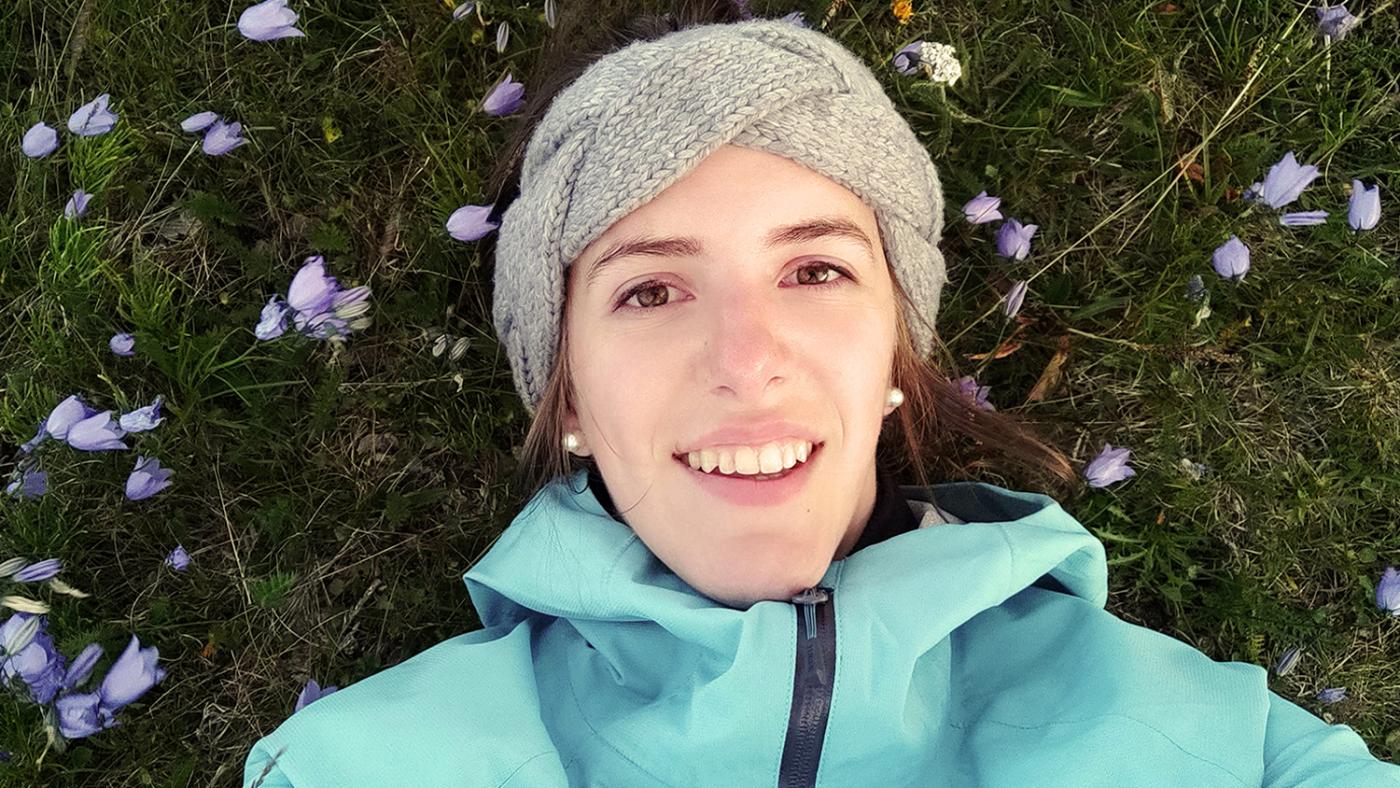
For the past five years, DUB has been publishing a yearly list of fifteen promising students with projects and achievements out of the ordinary. UU itself also rewards extraordinary students yearly, be it for writing the best thesis, for getting involved with the most noteworthy extracurricular activity, or for promoting inclusion and diversity at the university. Some students have written to us saying that these lists and accolades only make them feel bad about themselves – as though they were supposed to be winning an Olympic medal or discovering a new state of matter by their mid-twenties.
That’s why DUB decided to also celebrate the average UU student. After all, they, too, have valuable experiences. Just because you’re not making headlines, that doesn’t mean you’re not going to have a great life or career. We then published two questionnaires – one for Dutch students and another one for international students – looking to find someone who would personify the average person enrolled at UU. Where do they come from? How old are they? How many cups of coffee do they drink a day?
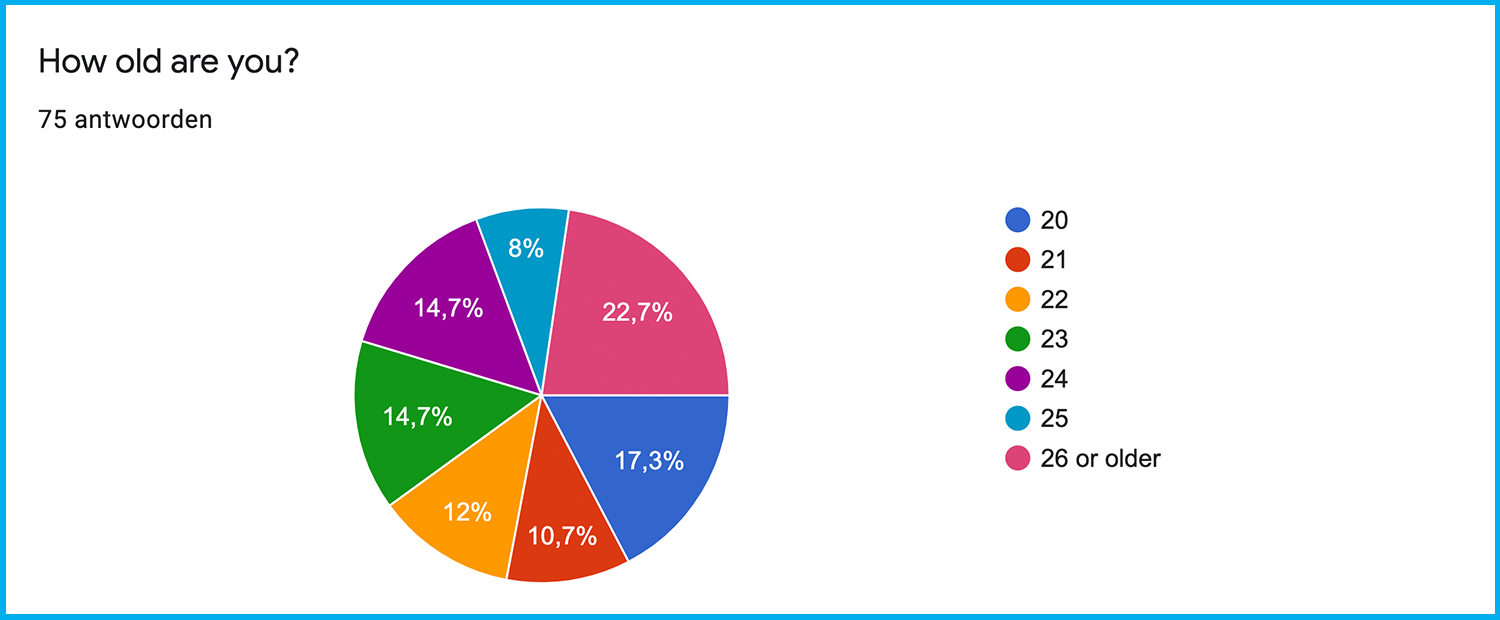
Main findings
Although our sample isn’t representative – we’ve received 78 responses while about 6,000 of UU's 40,000 students come from abroad – the answers are nevertheless interesting to see. Women formed the majority of respondents in our survey (72 percent), which reflects the reality of Utrecht University, where women are roughly 60 percent of the student body, both at Bachelor's and Master's level.
In our survey, the most chosen age bracket is 26 or older, which makes sense considering 55 percent of respondents are in Utrecht to pursue a Master’s degree. Again, that comes as no surprise as only six of UU's 50 Bachelor's degrees are taught exclusively in English, while 103 of the 150 Master's programmes are. In 2021-2022, foreigners formed 31 percent of new enrolments at Master's level and 10 percent of new enrolments at Bachelor's level.
Most international students in the Netherlands come from Germany and Italy, which was indicated in our survey as well: with ten respondents each, they were way ahead of the other countries mentioned.
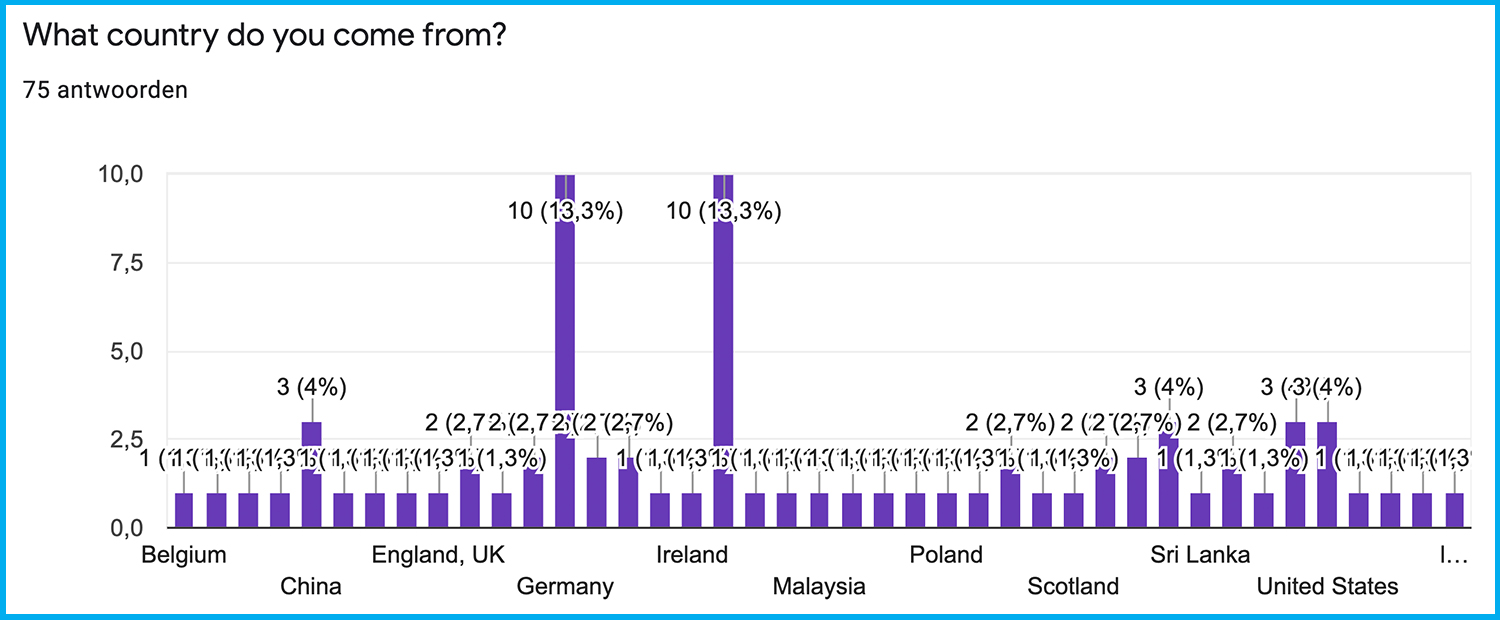
Alice Pravato fits that description perfectly. Born in Italy, she’s in the first year of a two-year Master’s in Regenerative Medicine & Technology at the age of 26. Like the students who contacted us about the Promising Fifteen list, Alice feels most pressured when reading that type of article. “They make me feel old. Like I’m falling behind and I could be doing better at my age”.
Alice is a little bit older than her classmates because she didn’t go to college right after graduating from high school. First, she spent one year in Germany working as an au-pair to learn German. Then, she headed to Norway, where she had already done an exchange during high school. “I spent two years working at a food-selling kiosk so that I could learn to speak Norwegian at C1 level and then apply to university there”, she explains. The Netherlands was not the first country that came to her mind when she thought of a Master’s. “I assumed I would go back to Germany since I already spoke the language, but I got really interested in UU’s study programme”.
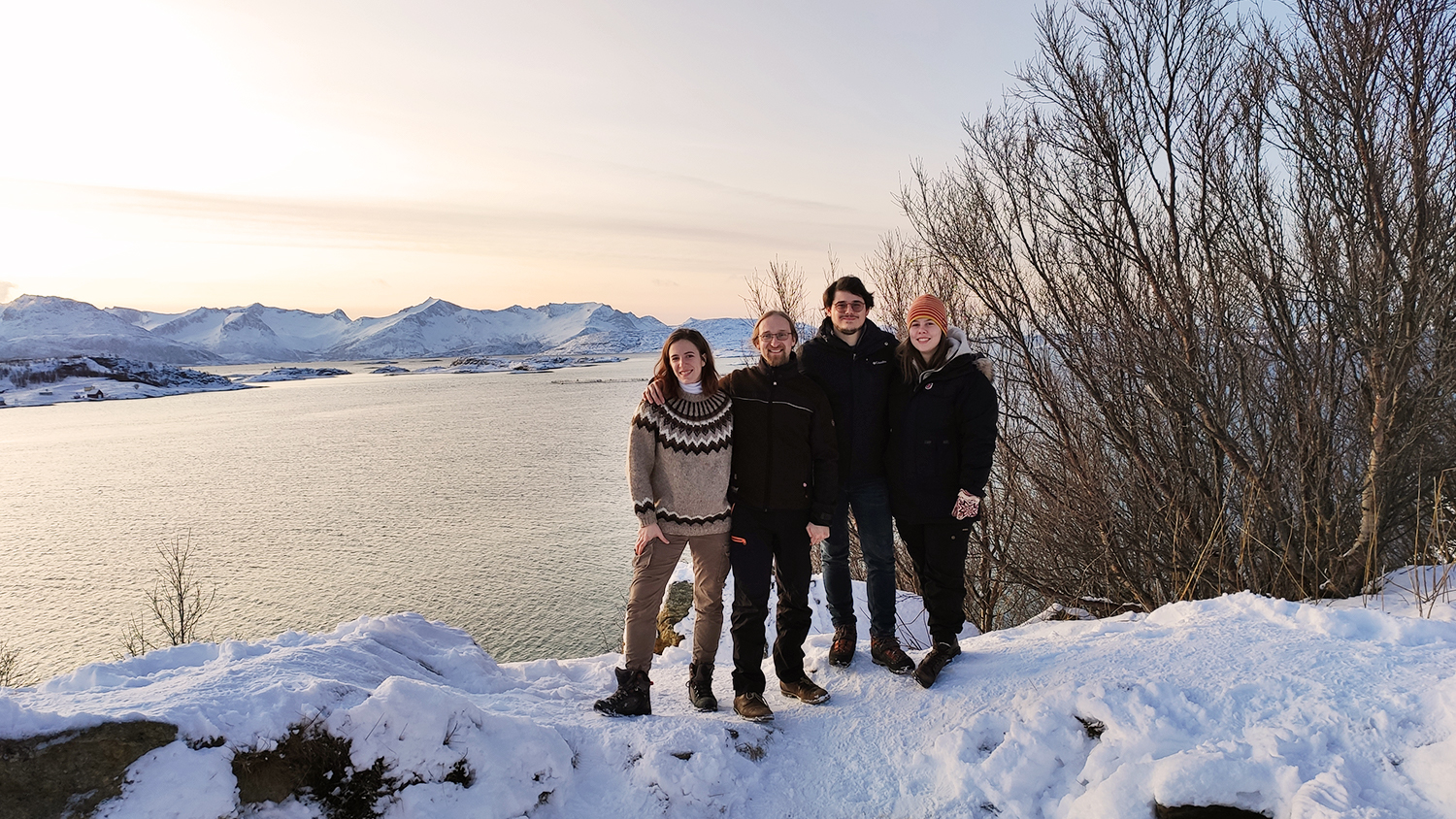
Alice (left) wearing a sweater of her own making in Norway. Photo: courtesy of the student.
In our survey, the most common reason for coming to Utrecht is that Dutch universities offer programmes in English but they cost much less than universities in English-speaking countries (reason mentioned by 30 percent of those surveyed), closely followed by “the programme I wanted doesn’t exist in my home country” (28 percent).
A significant number of respondents (40 percent) don’t know yet whether they want to stay in the Netherlands after they graduate. That goes for Alice as well. “Covid has taught me that things can change very quickly, so you can never really know what the future will hold. That’s why I’m focusing on the present moment”, she says. “I don’t know if a PhD position would be the best fit for me. I’m exploring some business-related environments right now. I’m part of the honours programme about business and entrepreneurship. But I don’t know what I want to do, really”.
Approximately 30 percent of respondents plan to remain in Utrecht to either continue their studies or look for a job. According to the latest report on stay rates by Nuffic, the Dutch organisation for internationalisation in education, on average 25 percent of international students still reside in the Netherlands five years after graduation.
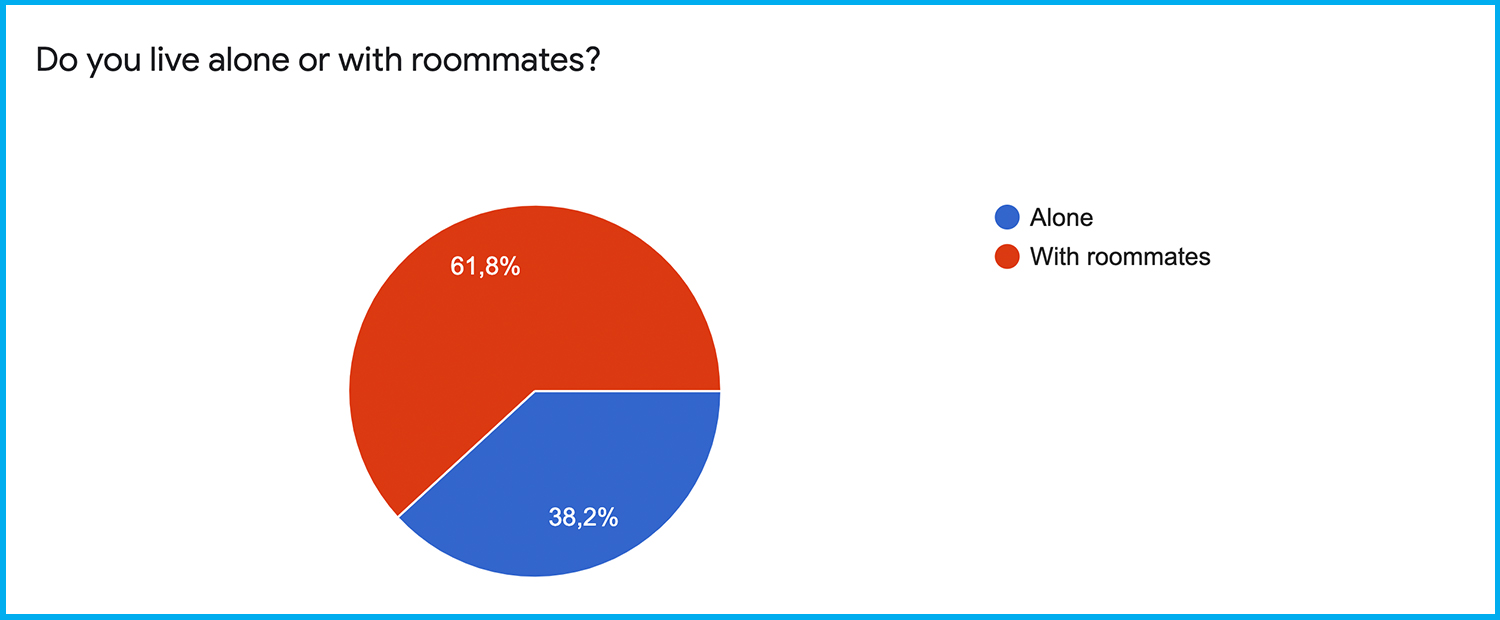 Housing
Housing
Since housing is a pressing issue in Utrecht, we’ve also asked international students to tell us about their living situation. It turns out that 61 percent of UU’s internationals live with roommates in private rentals, according to our survey. Surprisingly, over half of the students surveyed by DUB said it took them only one month to find their first accommodation in the city. According to the latest survey on the housing situation of international students in Utrecht, published by the International Student Housing Assistance (ISHA), the average search time has increased drastically from 4.1 weeks in 2018 to 6.6 weeks in 2019.
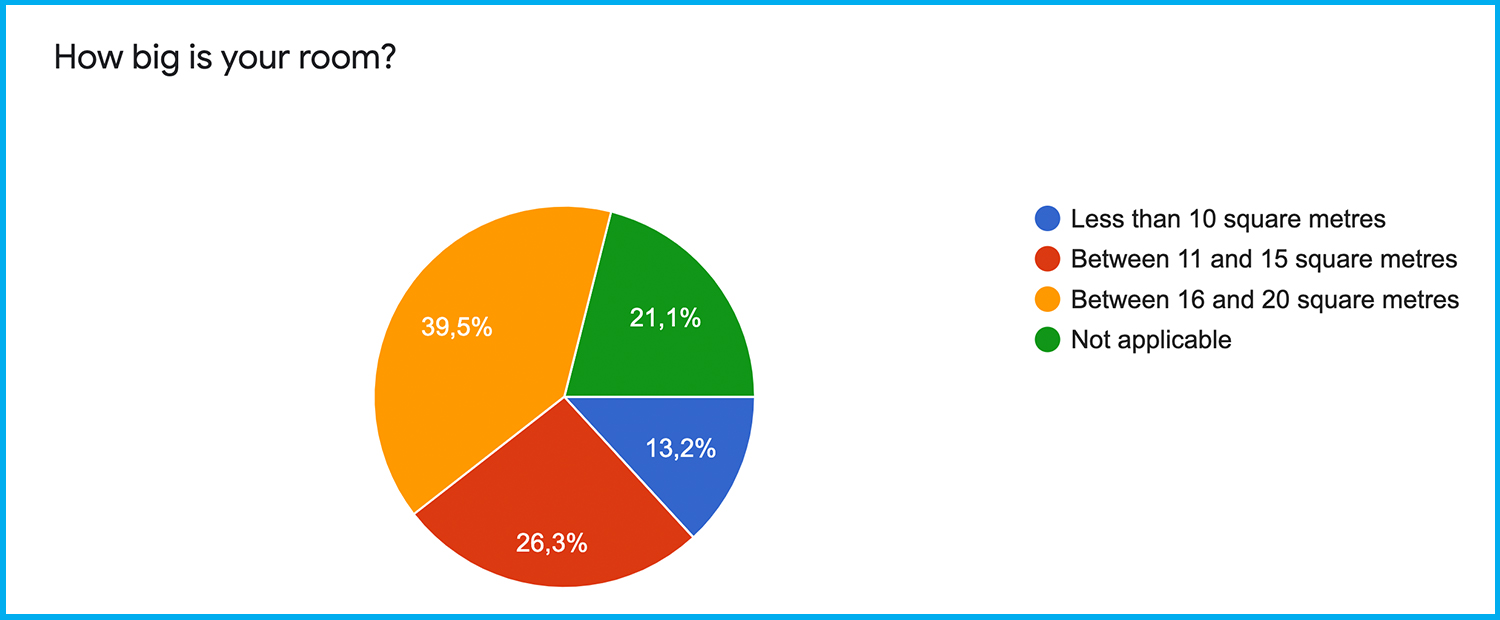
Our questionnaire shows that international students’ rooms are relatively spacious, too: almost 40 percent live in a room measuring 16 to 20 square metres. Alice deviates from the average in that regard: she is part of the minority (13 percent) of internationals living in rooms sized 10 square metres or less. “It wasn’t easy to be in such a small room during Covid, but I kept reminding myself that I was one of the lucky ones for even having a room”, says the student.
But having such a small room means she needs another place to study. That’s when the library comes in handy. “One of the things I’ve learned from the pandemic is that I absolutely need to separate the spaces where I work and where I relax”, says Alice.
She currently pays 600 euros a month for the room she’s found on Facebook, falling in the same price category as over 46 percent of respondents. According to the ISHA report, the average rent paid by international students in Utrecht is 617.53 euros. ISHA adds that the majority of international students in Utrecht live either alone or with up to two roommates, although 23 percent of the respondents in their survey have 5 roommates or more. Those with roommates tend to live only with other international students. Alice shares the house with four other international students.
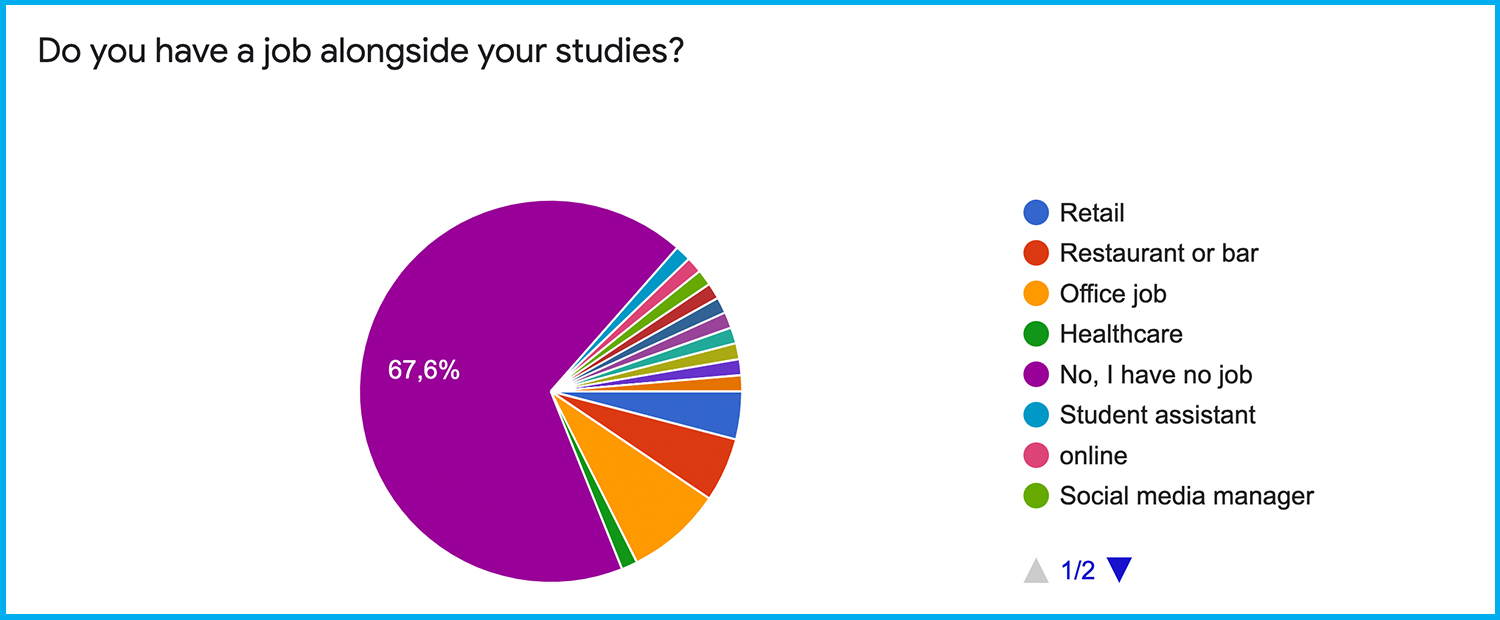
Studies
Like 67 percent of those surveyed by DUB, Alice is not working alongside her studies. Her parents are paying for her studies and living expenses, as is the case for half of the respondents. The second most popular way of financing their studies at UU is through savings, mentioned by 22 percent of those surveyed. 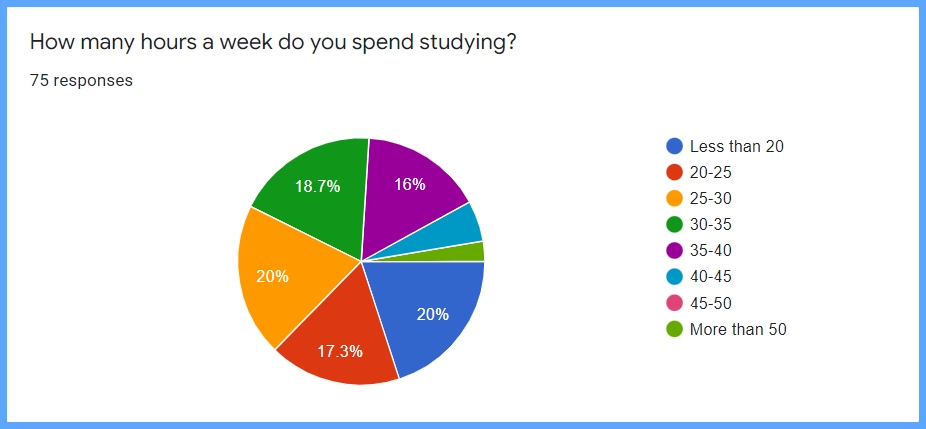
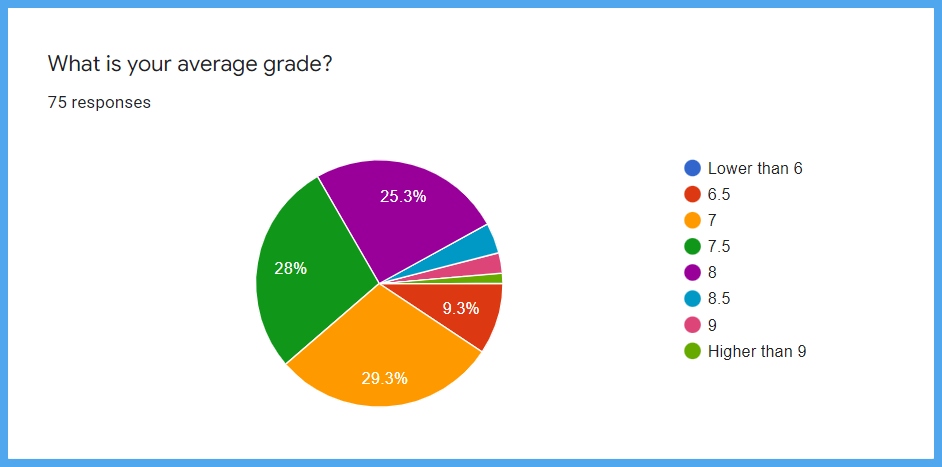
The amount of hours the students who filled our questionnaire spend studying varies greatly. Alice dedicates between 25 and 30 hours each week to studying and her average grade is 7.5.
International students also dedicate a lot of their time to social media: almost half of those surveyed (Alice included) said they spend one to two hours a day scrolling through their socials, with another 30 percent giving social media three to four hours of their day. Over 50 percent of respondents admit that social media impacts their academic performance negatively, but 36 percent don't think so.
Language and culture
With her fluency in Italian, English, German, and Norwegian, Alice is above average when it comes to the number of languages spoken. But she is representative in the sense that international students at UU tend to be polyglots.
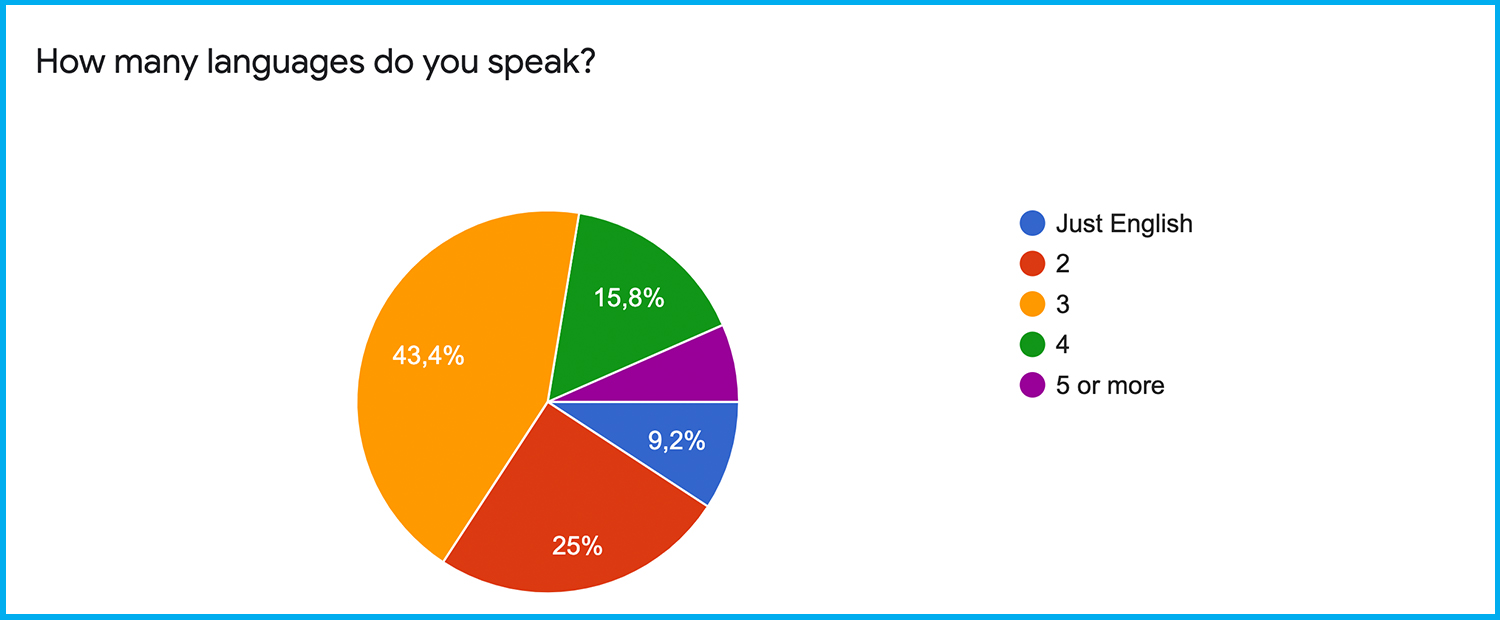
Now, Alice is going for her fifth language: similarly to 39 percent of respondents, she’s learning the basics of Dutch. Another 39 percent said they are learning Dutch with the goal to achieve fluency. An article published by DUB in 2019, however, shows that internationals tend to drop out of their Dutch courses quickly. “I strongly believe that, wherever I move, I have to learn the language because I appreciate people learning Italian when they are in my country. I want to be part of the local culture. It’s much easier to get in touch with locals if you know at least the basics”, she says.
About the Dutch, Alice appreciates their energy and motivation. “It might just be UU, but it’s really beautiful to see how passionate they are about what they do. At least in the Life Sciences, everyone is so inspiring. Maybe I’m ‘average’ but all the people who have been selected for my Master’s are excellent, so just being part of this is amazing”, she notes. A good reminder for when those lists and awards make us feel insecure.
From the Norwegians, Alice says she got a lesson on kindness and community spirit, while the Germans taught her about work ethics. But what part of her will always remain deeply Italian, no matter where she goes? “The social aspect. Since I’m a little bit older than my fellow students, I have a bit of a ‘mama’ status: everything must be approved by me and I often make food for them… You know, the stereotypical Italian mood, always joyful and gregarious”.
Contributing to her "mama" image is the fact that Alice knits her own sweaters. “I have to do something with my hands when I’m watching a series, for example. Otherwise I feel unproductive”. She is also teaching herself how to play the ukulele, but so far, she has no intention of ever entertaining her friends with it: “it’s just for myself”.
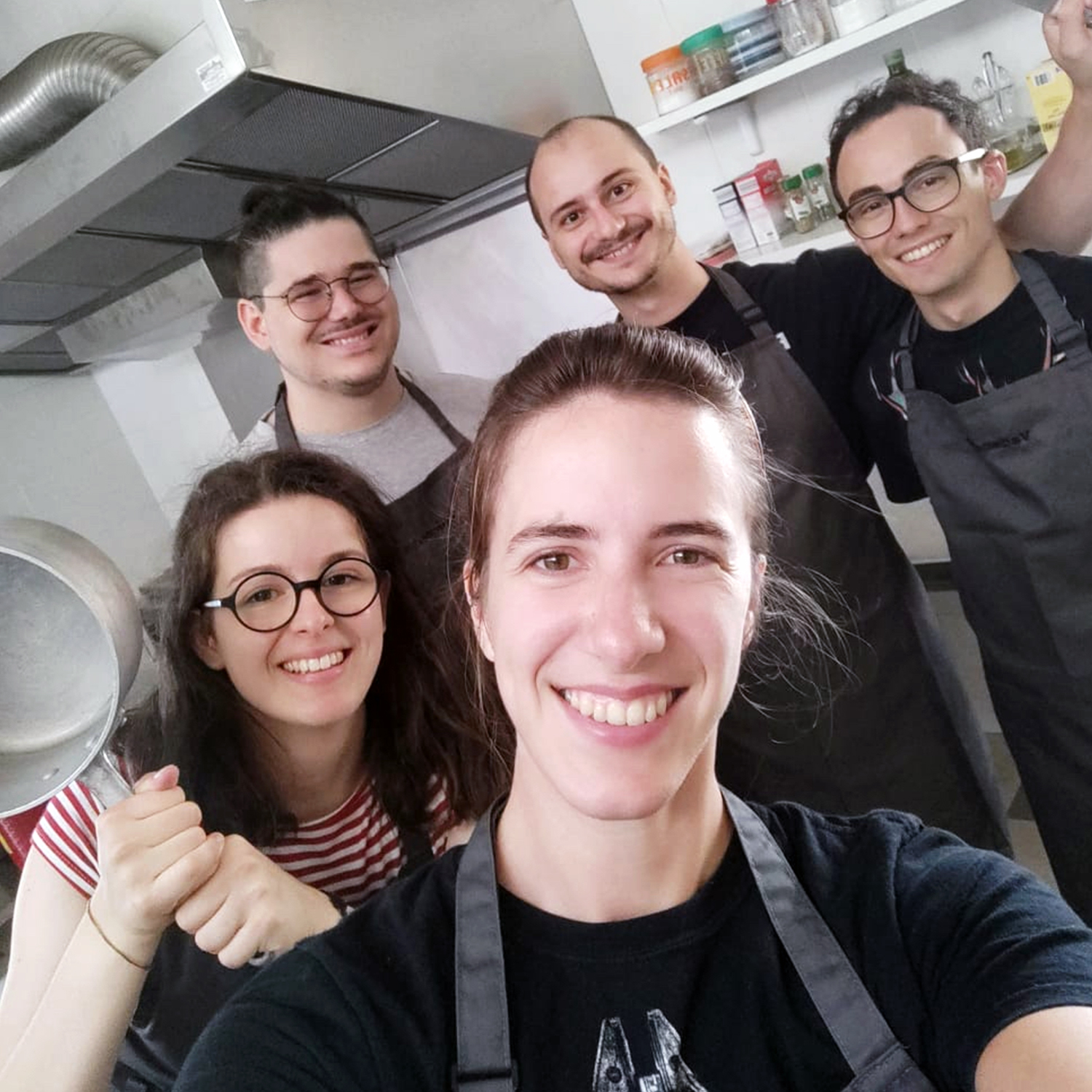
Cooking with friends made at UU. Photo: courtesy of the student.
Personal life, hobbies and spare time
Speaking of being gregarious, Alice is glad she managed to make friends in Utrecht despite the pandemic. She says she does feel connected to the university. An important reason behind it is the fact that she’s been able to have classes in person most of the time.
The majority of her friends are classmates from her Master’s, but she’s also met other internationals during the introduction week. “I wasn’t going to go because I thought I would meet enough people in my programme already, but I’m so glad I ended up going”. She’s also part of the Radio Life Sciences podcast, thanks to which she has met many people. Today, Alice has three to four close friends and rates her mental health a 7, as do most respondents.
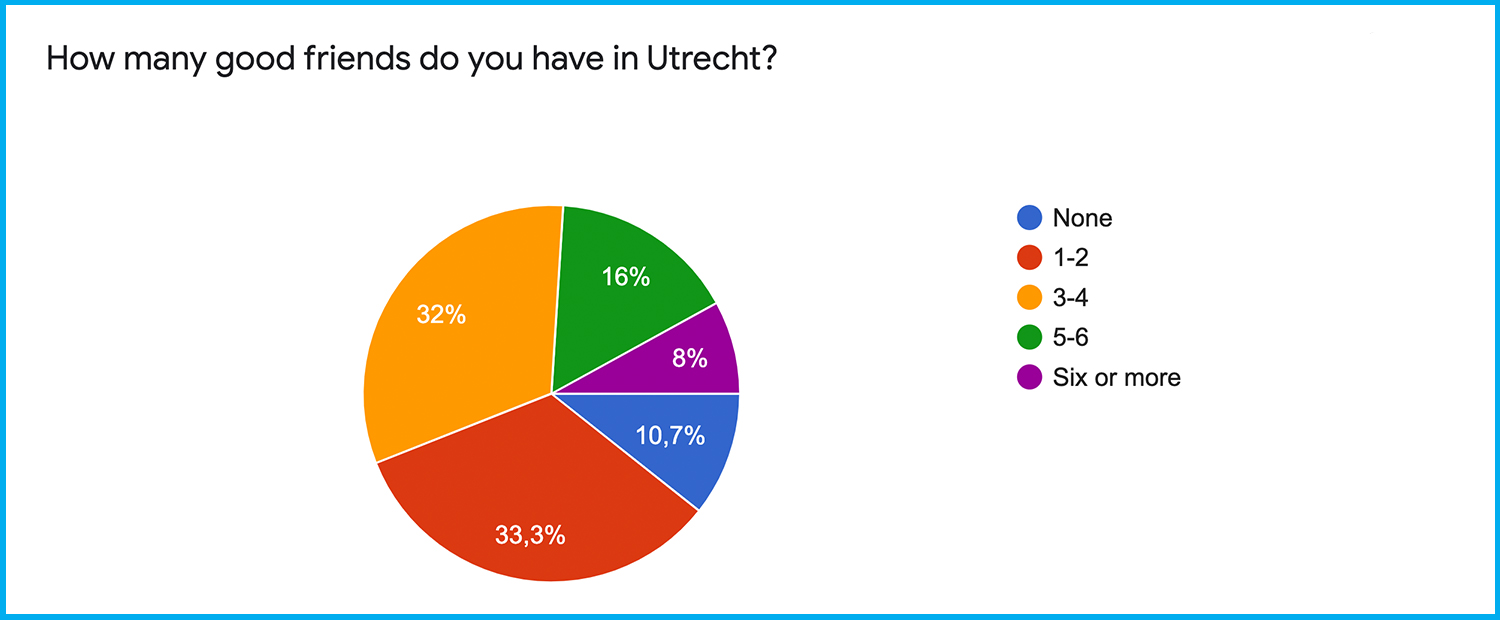
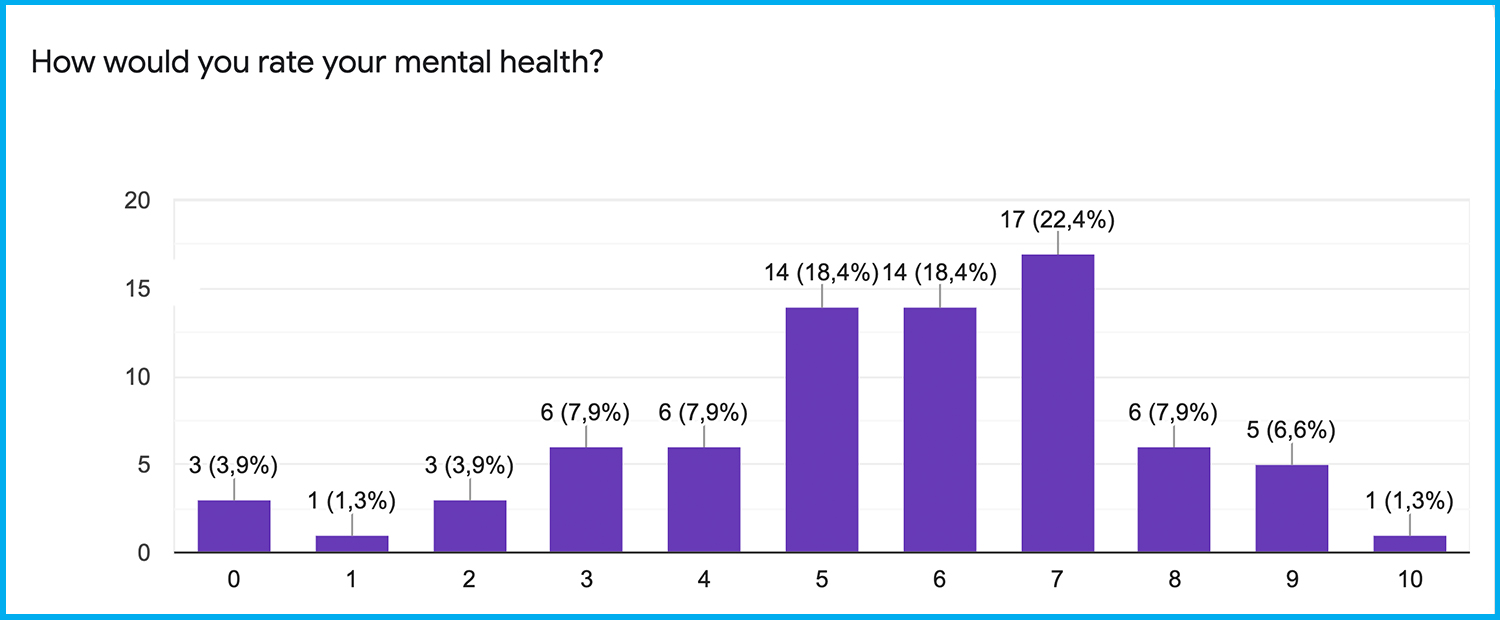
Alice chats with her parents about once a week and goes once every six months back to Italy, two habits that match the average in our survey. As pointed out by numerous studies, feeling lonely is practically a given among international students in the Netherlands. The results of DUB's survey were no different: over 61 percent of respondents admit to feeling lonely "sometimes" — Alice among them — and 28 percent feel that way "often".
As per our questionnaire, some 60 percent of internationals at UU are in a serious relationship. When she answered our questionnaire, Alice was one of the few who said their status was “complicated”. But now she can surely affirm that she’s joined the majority: things just got serious with a Dutch guy she met on Tinder – an app that apparently wasn’t used much by international students back when the country was on lockdown, as 32 percent of respondents said they did not have sex at all at the time. Only 9 percent reported having had one or more one-night-stands during lockdown.
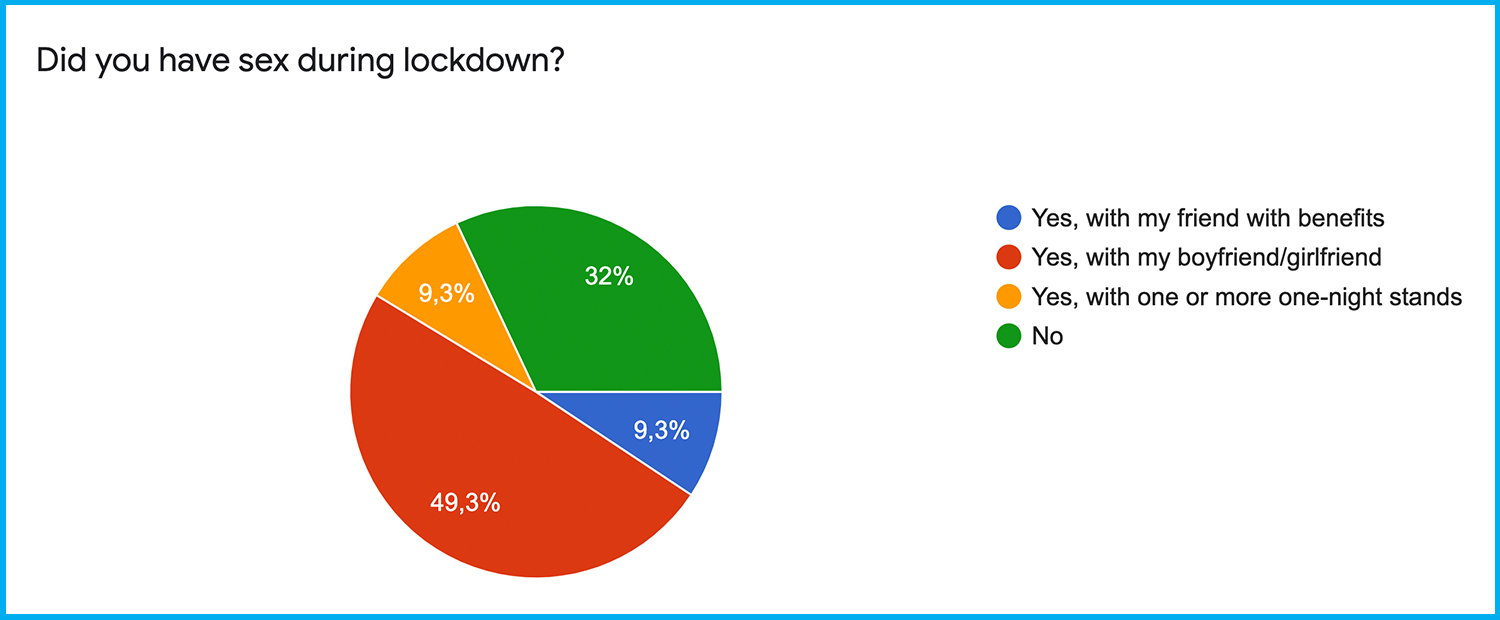
Remember the question about the amount of coffee they ingest each day? Well, not that much. Although coffee is the most popular non-alcoholic beverage, with the preference of 38 percent of respondents (tea and water shared the second and third places with 29 percent and 20 percent, respectively), 60 percent of the students tally the number of cups consumed at zero. Those who do drink coffee tend to stick to a single cup a day.
Alcohol doesn’t look that popular either, as 68 percent of respondents either drink no alcohol at all or consume less than five glasses a week. Drugs, however, are a different story: more than 65 percent of students surveyed admit to having used them at least once. Of those, more than 70 percent consume cannabis regularly.
Asked whether they have a tattoo, 77 percent of respondents said “no”.
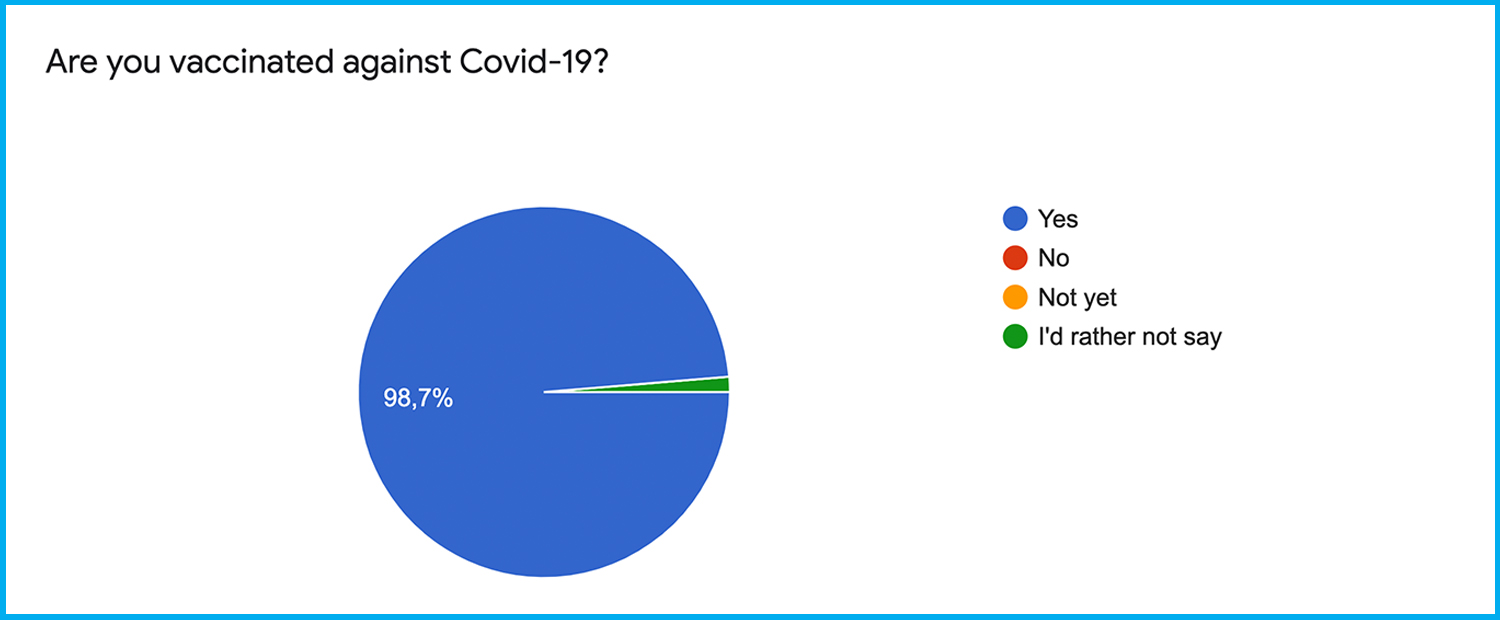 Covid
Covid
But that is certainly not because they are scared of needles: 98 percent of the international UU students who took our survey are vaccinated against Covid-19. Most of them (41 percent) caught the virus once, while 38.7 percent never had it. Alice was in that group when DUB interviewed her. “I’m a survivor! I don’t know how I did this, but here I am”, she celebrated.
That was quite a feat indeed, considering she had to quarantine twice because of her roommates. “They stayed in their room all the time”, she says. “When they used our shared bathroom, they disinfected everything they’d touched. They also refrained from using the kitchen, ordering takeout instead”.
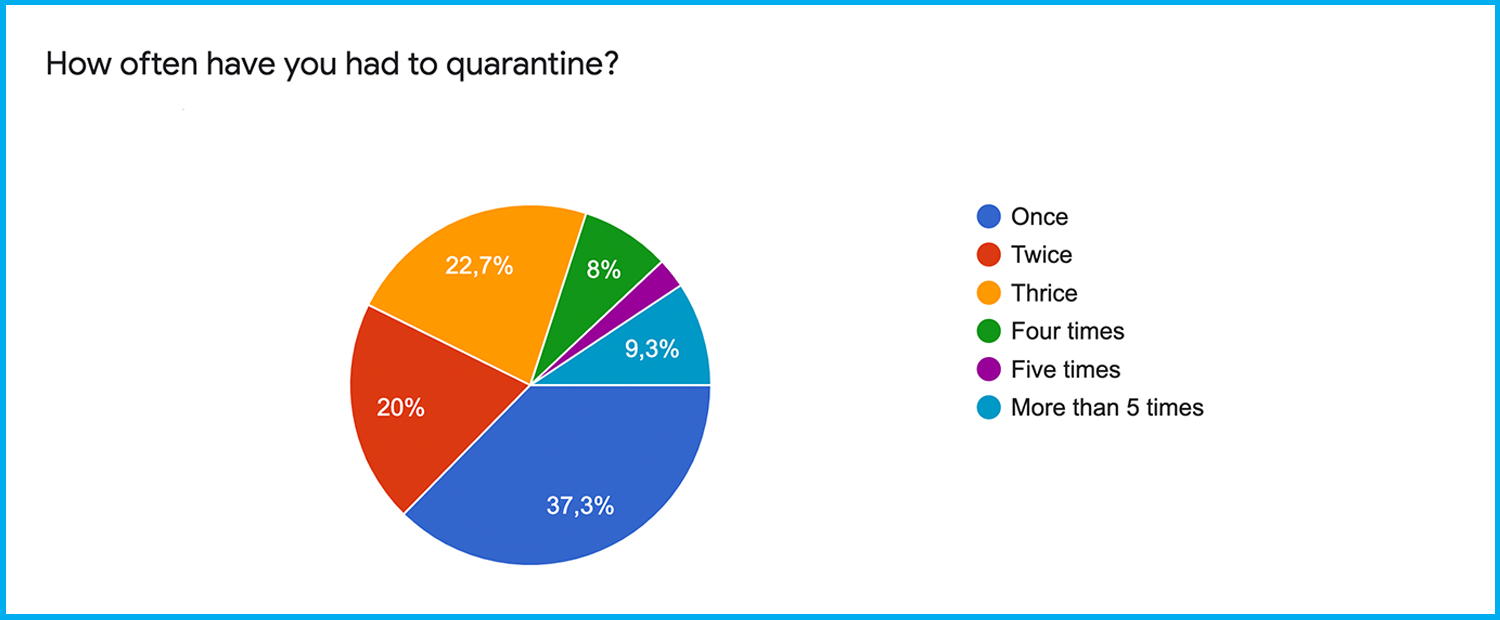
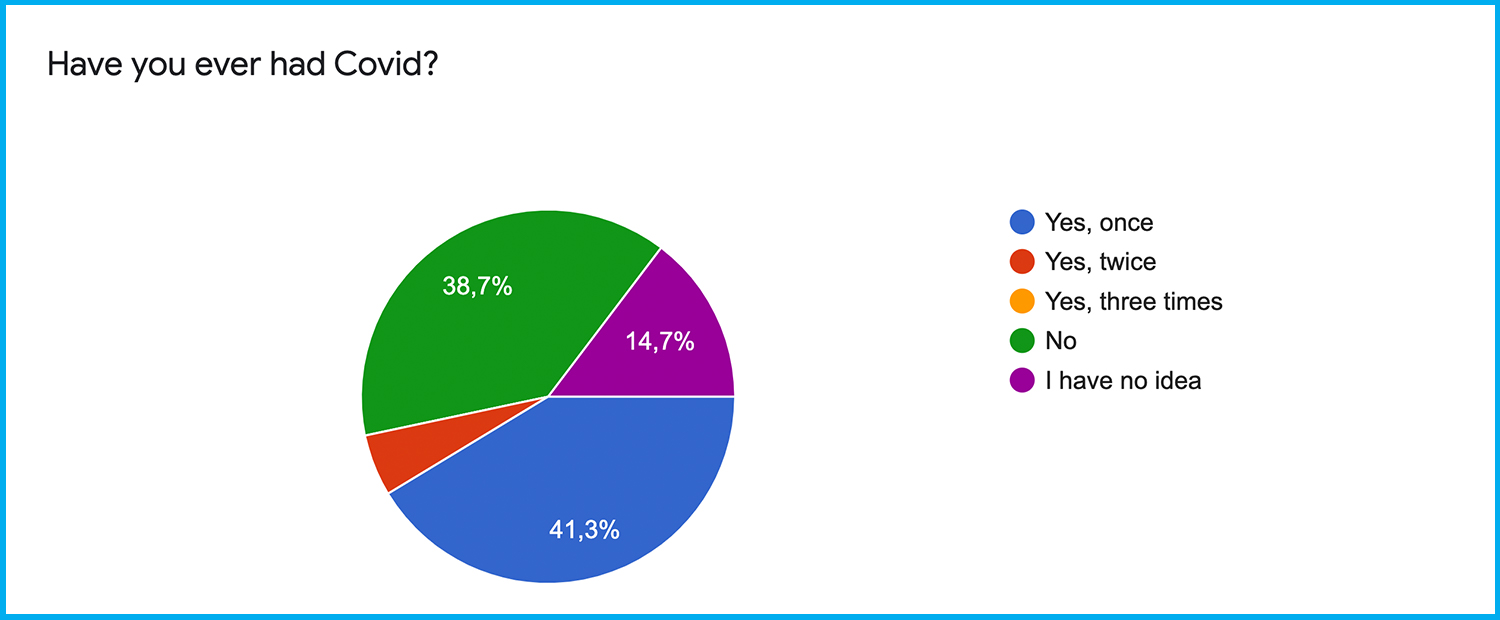
Unfortunately, one week later, Alice tested positive for Covid-19. That’s why our photographer wasn’t able to take her pictures and we’re featuring photos from her personal archive instead. "That's a super pity", she wrote us via e-mail.